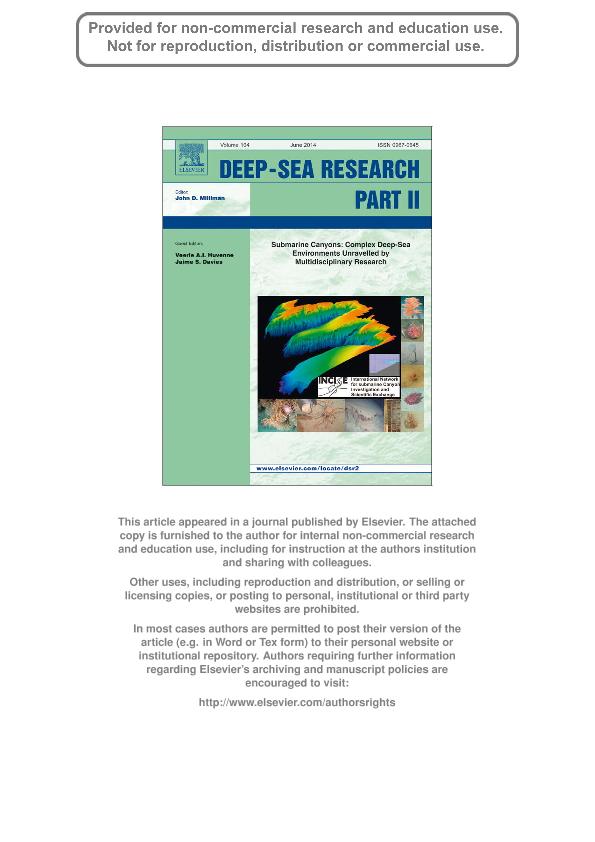Mostrar el registro sencillo del ítem
dc.contributor.author
Schejter, Laura

dc.contributor.author
Lopez Gappa, Juan Jose

dc.contributor.author
Bremec, Claudia Silvia

dc.date.available
2017-06-29T19:39:07Z
dc.date.issued
2014-06
dc.identifier.citation
Schejter, Laura; Lopez Gappa, Juan Jose; Bremec, Claudia Silvia; Epibiotic relationships on Zygochlamys patagonica (Mollusca, Bivalvia, Pectinidae) increase biodiversity in a submarine canyon in Argentina; Elsevier; Deep Sea Research Part II: Topical Studies in Oceanography; 104; 6-2014; 252-258
dc.identifier.issn
0967-0645
dc.identifier.uri
http://hdl.handle.net/11336/19189
dc.description.abstract
The continental slope of the southern SW Atlantic Ocean has many distinguishable deep submarine canyons, varying in depth and extension. The benthic fauna within one of them, detected in April 2005 by means of a multibeam SIMRAD EM1002 sonar, and located at 43°35′S to 59°33′W, 325 m depth, was studied to discuss faunal affinities with the neighbouring Patagonian scallop fishing grounds located at upper slope depths. In order to add faunal information to the previous general study, we studied the epibiotic species settled on Patagonian scallops (the dominant species in the area) collected in the reference sampling site using a 2.5-m mouth-opening dredge, 10 mm mesh size. We sampled 103 scallops with shell heights between 22 and 69 mm; epibionts were recorded on both valves. We found 53 epibiotic taxa, which were most conspicuous on the upper valve. Bryozoa was the most diverse group (34 species) while Polychaeta was the most abundant group, recorded on 94% of the scallops. Stylasteridae (2 species) and Clavulariidae (Cnidaria) conform newly recorded epibionts on Z. patagonica and the sponge Tedania (Tedaniopsis) infundibuliformis also represents a new record for the SW Atlantic Ocean.
dc.format
application/pdf
dc.language.iso
eng
dc.publisher
Elsevier

dc.rights
info:eu-repo/semantics/openAccess
dc.rights.uri
https://creativecommons.org/licenses/by-nc-sa/2.5/ar/
dc.subject
Submarine Canyon
dc.subject
Epibiotic Associations
dc.subject
Biodiversity
dc.subject
Zygochlamys Patagonica
dc.subject
Sw Atlantic Ocean
dc.subject
Species Richness
dc.subject
Bryozoa
dc.subject
Polychaeta
dc.subject.classification
Biología Marina, Limnología

dc.subject.classification
Ciencias Biológicas

dc.subject.classification
CIENCIAS NATURALES Y EXACTAS

dc.title
Epibiotic relationships on Zygochlamys patagonica (Mollusca, Bivalvia, Pectinidae) increase biodiversity in a submarine canyon in Argentina
dc.type
info:eu-repo/semantics/article
dc.type
info:ar-repo/semantics/artículo
dc.type
info:eu-repo/semantics/publishedVersion
dc.date.updated
2017-06-28T19:41:19Z
dc.journal.volume
104
dc.journal.pagination
252-258
dc.journal.pais
Países Bajos

dc.journal.ciudad
Amsterdam
dc.description.fil
Fil: Schejter, Laura. Consejo Nacional de Investigaciones Científicas y Técnicas. Centro Científico Tecnológico Mar del Plata. Instituto de Investigaciones Marinas y Costeras. Subsede Instituto Nacional de Investigación y Desarrollo Pesquero; Argentina
dc.description.fil
Fil: Lopez Gappa, Juan Jose. Consejo Nacional de Investigaciones Científicas y Técnicas. Oficina de Coordinación Administrativa Parque Centenario. Museo Argentino de Ciencias Naturales "Bernardino Rivadavia"; Argentina
dc.description.fil
Fil: Bremec, Claudia Silvia. Consejo Nacional de Investigaciones Científicas y Técnicas. Centro Científico Tecnológico Mar del Plata. Instituto de Investigaciones Marinas y Costeras. Subsede Instituto Nacional de Investigación y Desarrollo Pesquero; Argentina
dc.journal.title
Deep Sea Research Part II: Topical Studies in Oceanography

dc.relation.alternativeid
info:eu-repo/semantics/altIdentifier/doi/http://dx.doi.org/10.1016/j.dsr2.2013.10.010
dc.relation.alternativeid
info:eu-repo/semantics/altIdentifier/url/http://www.sciencedirect.com/science/article/pii/S0967064513004049
Archivos asociados
